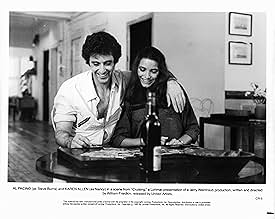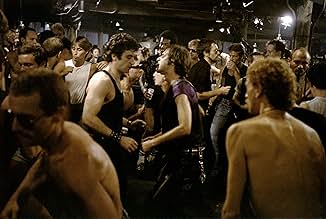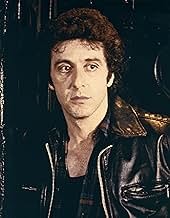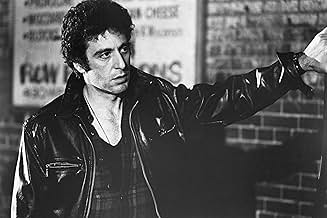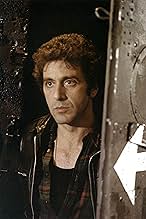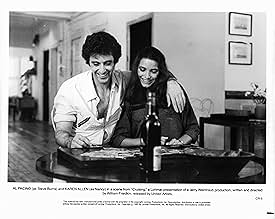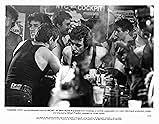Um detetive de polícia se disfarça na subcultura gay underground de Nova York para pegar um assassino em série que está matando homossexuais.Um detetive de polícia se disfarça na subcultura gay underground de Nova York para pegar um assassino em série que está matando homossexuais.Um detetive de polícia se disfarça na subcultura gay underground de Nova York para pegar um assassino em série que está matando homossexuais.
- Direção
- Roteiristas
- Artistas
- Prêmios
- 5 indicações no total
Ed O'Neill
- Det. Schreiber
- (as Edward O'Neil)
- Direção
- Roteiristas
- Elenco e equipe completos
- Produção, bilheteria e muito mais no IMDbPro
Avaliações em destaque
In New York, the ambitious police officer Steve Burns (Al Pacino) is assigned by his Captain Edelson (Paul Sorvino) to work uncover in the gay S&M underworld to seek out the serial-killer that is killing and severing the members of gays since he has the same appearance of the victims. Steve has the objective to be promoted to detective and get his golden shield and Capt. Edelson is the only one in the department who knows Steve's assignment.
Steve does not tell to his girlfriend Nancy (Karen Allen) his mission and he needs to learn the behavior of this community. During the investigation, Steve is affected by the discoveries in this new world, but Captain Edelson does not want him to quit his assignment.
In the 70's and 80's, Al Pacino was among my favorite American actors with his magnificent performances. "Cruising" is an original movie that discloses part of the society unknown to straight persons like me: the gay S&M world of New York in the late 70's.
I have seen this film at least four time and today for the first time on DVD, and my greatest question is how far a person would go to be promoted. Steve Burns dreams on having a golden shield and when he has his chance, he accepts a dangerous psychological mission to find the serial-killer that is killing gays and affects his personal life and his relationship with his girlfriend. The conclusion is one of the most ambiguous that I have ever seen in an American movie, when Steve looks at his image on the mirror. My vote is eight.
Title (Brazil): "Parceiros da Noite" ("Night Partners")
Steve does not tell to his girlfriend Nancy (Karen Allen) his mission and he needs to learn the behavior of this community. During the investigation, Steve is affected by the discoveries in this new world, but Captain Edelson does not want him to quit his assignment.
In the 70's and 80's, Al Pacino was among my favorite American actors with his magnificent performances. "Cruising" is an original movie that discloses part of the society unknown to straight persons like me: the gay S&M world of New York in the late 70's.
I have seen this film at least four time and today for the first time on DVD, and my greatest question is how far a person would go to be promoted. Steve Burns dreams on having a golden shield and when he has his chance, he accepts a dangerous psychological mission to find the serial-killer that is killing gays and affects his personal life and his relationship with his girlfriend. The conclusion is one of the most ambiguous that I have ever seen in an American movie, when Steve looks at his image on the mirror. My vote is eight.
Title (Brazil): "Parceiros da Noite" ("Night Partners")
I do well remember all the outrage when word about Cruising being filmed on location in the streets of New York with all kinds of protesters from the GLBT community picketing the set. Word had gotten out that the film was going to be about the Leather/S&M scene and everyone that I knew was upset.
Viewed 26 years later Cruising is mild stuff compared to some of what is shown on television today. There isn't a prime time TV series that today doesn't have some gay themed episode on it during its season. Some are sensitive and some are far more crassly exploitive than Cruising could ever aspire to be.
The fuss back then was that in many places including the location of the film, New York City, gay civil rights was not on the statute books. A whole lot of people were trying to make that happen and a film like Cruising was feared in that it would give homophobes a lot of ammunition against the proposed civil rights law.
People needn't have worried. The cause and the community proved a lot stronger than the impact of one film at the box office.
Without all the politics involved, Cruising is a murder mystery. There's a troubled young man with a whole lot of issues murdering and dismembering men he picks up in various locales in New York. Chief of Detectives Paul Sorvino picks officer Al Pacino because in looks and build he fits the physical profile of the victims. Cruising is the story of Pacino's undercover investigation looking for that killer. It also is a story of Pacino reexamining a whole lot of preconceived notions about human sexuality in general.
As it turns out I happen to know one of the cast members of the film who had a small three line speaking role in the film and with Al Pacino himself. He related to me that when the casting call came out, he came in the required leather uniform and had three levels of audition. First with the casting director, then with Bill Friedkin and finally with Al Pacino himself.
What he also mentioned was that Pacino was a nice down to earth sort of fellow when he met him and easy to work with. And the reason he was easy to work with was that he was a man totally focused on the job at hand when on the set.
He also related to me that apparently Bill Friedkin had decided in advance to do some kind of a gay related story. The final script for Cruising beat out others including one that would have had a prostitution angle in it. Probably a worse image for a film than what Cruising was about. This writer whose script was rejected was a political activist as well and he was the one who got the ball rolling with all the protests.
My friend mentioned that among his own group of friends he lost only one permanently over his decision to work in the film. Everyone else in his circle saw the film and their reactions were a gamut of applause for the film to a total trashing. But only one individual broke with him over it.
Art sometimes predicts life. There is a shot during Al Pacino's travels through the bars and clubs of the West Village of 1980 of the Ramrod bar. After Cruising had come and gone from theaters, a man named Ronald Crumpley one November night in 1980 drove by with an Uzi and wounded six and killed two people. Things like that are still happening, even in some of the gay friendliest areas in the USA.
Besides Pacino and Sorvino, the performances to look for are those of Don Scardino as the young writer who lives next door to the apartment Pacino is located in during his undercover assignment and James Remar as Scardino's roommate who is a dancer. They have a volatile relationship and Scardino would be considered a battered spouse had they been able to marry. A story all to true, but hardly limited to same sex relationships.
Cruising will never rank in the top 10 of Al Pacino's films on anybody's list. But sufficient time has passed so that we can look at it with a bit more objectivity than was possible in 1980.
Viewed 26 years later Cruising is mild stuff compared to some of what is shown on television today. There isn't a prime time TV series that today doesn't have some gay themed episode on it during its season. Some are sensitive and some are far more crassly exploitive than Cruising could ever aspire to be.
The fuss back then was that in many places including the location of the film, New York City, gay civil rights was not on the statute books. A whole lot of people were trying to make that happen and a film like Cruising was feared in that it would give homophobes a lot of ammunition against the proposed civil rights law.
People needn't have worried. The cause and the community proved a lot stronger than the impact of one film at the box office.
Without all the politics involved, Cruising is a murder mystery. There's a troubled young man with a whole lot of issues murdering and dismembering men he picks up in various locales in New York. Chief of Detectives Paul Sorvino picks officer Al Pacino because in looks and build he fits the physical profile of the victims. Cruising is the story of Pacino's undercover investigation looking for that killer. It also is a story of Pacino reexamining a whole lot of preconceived notions about human sexuality in general.
As it turns out I happen to know one of the cast members of the film who had a small three line speaking role in the film and with Al Pacino himself. He related to me that when the casting call came out, he came in the required leather uniform and had three levels of audition. First with the casting director, then with Bill Friedkin and finally with Al Pacino himself.
What he also mentioned was that Pacino was a nice down to earth sort of fellow when he met him and easy to work with. And the reason he was easy to work with was that he was a man totally focused on the job at hand when on the set.
He also related to me that apparently Bill Friedkin had decided in advance to do some kind of a gay related story. The final script for Cruising beat out others including one that would have had a prostitution angle in it. Probably a worse image for a film than what Cruising was about. This writer whose script was rejected was a political activist as well and he was the one who got the ball rolling with all the protests.
My friend mentioned that among his own group of friends he lost only one permanently over his decision to work in the film. Everyone else in his circle saw the film and their reactions were a gamut of applause for the film to a total trashing. But only one individual broke with him over it.
Art sometimes predicts life. There is a shot during Al Pacino's travels through the bars and clubs of the West Village of 1980 of the Ramrod bar. After Cruising had come and gone from theaters, a man named Ronald Crumpley one November night in 1980 drove by with an Uzi and wounded six and killed two people. Things like that are still happening, even in some of the gay friendliest areas in the USA.
Besides Pacino and Sorvino, the performances to look for are those of Don Scardino as the young writer who lives next door to the apartment Pacino is located in during his undercover assignment and James Remar as Scardino's roommate who is a dancer. They have a volatile relationship and Scardino would be considered a battered spouse had they been able to marry. A story all to true, but hardly limited to same sex relationships.
Cruising will never rank in the top 10 of Al Pacino's films on anybody's list. But sufficient time has passed so that we can look at it with a bit more objectivity than was possible in 1980.
When body parts of men start showing up in the Hudson River, police come to believe a serial killer is targeting gay men. Under intense pressure from the media, gay advocacy groups, the city's elected officials, Steve Burns (Al Pacino) is assigned to go undercover in the fringe S&M gay scene as he has a similar profile and build to the men being killed. As Steve adopts the alias of John Forbes, he finds himself further and further entrenched and drawn to the lurid allure of the scene.
Based on the 1970 novel Cruising by Gerald Walker, French Connection producer Philip D'Antoni had approached Friedkin earlier in his career only for Friedkin to turn it down due to lack of interest. D'Antoni then approached Steven Spielberg, but was unable to find studio backing. When the rights were bought by Jerry Weintraub years later, Friedkin had warmed up to the idea thanks to his exposure to a series of articles by Village Voice writer Arthur Bell as well as encounters with former police officer Randy Jurgensen who had done similar deep cover work to investigate a series of gay murders. Not only was the film prone to frequent conflicts with the MPAA to secure an R rating with nearly 40 minutes of deleted footage of explicit material in the various bars, but the film was also subject to massive protests and pickets from gay rights groups who characterized the film as homophobic and anti-gay. In the years since it's troubled release the film continues to be discussed and has found appreciation among directors such as the Safdie brothers, Nicholas Winding Refn, and Quentin Tarantino.
The movie is very giallo like with its lurid sexualized murders which are investigated in a way where the film is more concerned with crafting an atmosphere and sense of character as Friedkin captures the seamy side of New York's nightlife. While Al Pacino does well playing the audience proxy as he reacts to the world crafted by Friedkin's film, there is a sense that Pacino is a bit more secured in his sexuality than the filmmakers intended. As an experience the film is simply unforgettable.
William Friedkin's Cruising is a tense and thrilling film that captures its lurid atmosphere so vividly you can feel it with every scene. While the movie's loose structure and ambiguous payoffs will challenge viewers, in terms of craft of filmmaking Cruising has few equals.
Based on the 1970 novel Cruising by Gerald Walker, French Connection producer Philip D'Antoni had approached Friedkin earlier in his career only for Friedkin to turn it down due to lack of interest. D'Antoni then approached Steven Spielberg, but was unable to find studio backing. When the rights were bought by Jerry Weintraub years later, Friedkin had warmed up to the idea thanks to his exposure to a series of articles by Village Voice writer Arthur Bell as well as encounters with former police officer Randy Jurgensen who had done similar deep cover work to investigate a series of gay murders. Not only was the film prone to frequent conflicts with the MPAA to secure an R rating with nearly 40 minutes of deleted footage of explicit material in the various bars, but the film was also subject to massive protests and pickets from gay rights groups who characterized the film as homophobic and anti-gay. In the years since it's troubled release the film continues to be discussed and has found appreciation among directors such as the Safdie brothers, Nicholas Winding Refn, and Quentin Tarantino.
The movie is very giallo like with its lurid sexualized murders which are investigated in a way where the film is more concerned with crafting an atmosphere and sense of character as Friedkin captures the seamy side of New York's nightlife. While Al Pacino does well playing the audience proxy as he reacts to the world crafted by Friedkin's film, there is a sense that Pacino is a bit more secured in his sexuality than the filmmakers intended. As an experience the film is simply unforgettable.
William Friedkin's Cruising is a tense and thrilling film that captures its lurid atmosphere so vividly you can feel it with every scene. While the movie's loose structure and ambiguous payoffs will challenge viewers, in terms of craft of filmmaking Cruising has few equals.
Too many things wrong with this one to really care for it. The main problem is too much focus on over-the-top depictions of the gay S&M subculture, and not enough on its characters. The undercover cop (Al Pacino), his girlfriend (Karen Allen), and the killer (???) are all ridiculously underdrawn. We don't get enough of what's going through the cop's mind as he's undercover, the girlfriend is only there to serve as a barometer of his heterosexuality, and the killer has some cliché "daddy issues." We do, however, get public fisting ffs.
Especially for 1980, it's unfortunate that this was the window mainstream America got into gay life, as it felt voyeuristic and intended to shock, not serve as a source of understanding or empowerment, at least as best possible as a backdrop to a murder mystery. Maybe the neighbor character, the aspiring writer, was intended to balance some of this out, but he was quickly lost, perhaps by things like the ridiculous man in the precinct house wearing nothing but a jockstrap and walking into interrogations to slap gay suspects around. What the hell was that?
I loved the little bits critiquing the police department at various levels - the beat cops harassing guys on the street and forcing one to perform oral sex, the captain (Paul Sorvino) who too quickly looks the other way, and the chief of detectives who doesn't really empathize with the victims, only wanting to avoid untimely negative publicity. It's too bad more wasn't done with this, but maybe there was a moment of transformation in the captain finding that last body.
The story doesn't really hold together as a police procedural, however. Maybe the film didn't want us to think about Pacino's character having to go home with guys to be effective at his assignment, so a lot of the time, he's just standing around in a bar, watching the raunchy antics of the wild crowd. Early on we're made to understand he's working for the captain only, with no one else knowing about it, but then in one critical scene swarms of cops come to his aid - only to then disappear at the end, when he acts completely alone again. There are also attempts at adding ambiguity into the story in several ways, but they all felt more forced than intriguing.
It's Pacino's character that ends up being the real mystery. You could see this as a man whose bisexuality is awakened, that he goes home with enough men like the guy we see him following out of the park that he loses interest in his girlfriend, and then later knows the repartee well in the climactic encounter. You could also see it as a straight man who has been overwhelmed by what he's seen and done, so much so that his relationship suffers along the way, and even when he's back with her at the end, he's liable to suffering flashbacks and trauma. It was interesting pondering that, but it felt like the film was being less artistic in its ambiguity, and more inhibited by what it felt it could show in a 1980 Hollywood production with a big star like Pacino. Regardless, it was less than completely satisfying, like everything else here.
Especially for 1980, it's unfortunate that this was the window mainstream America got into gay life, as it felt voyeuristic and intended to shock, not serve as a source of understanding or empowerment, at least as best possible as a backdrop to a murder mystery. Maybe the neighbor character, the aspiring writer, was intended to balance some of this out, but he was quickly lost, perhaps by things like the ridiculous man in the precinct house wearing nothing but a jockstrap and walking into interrogations to slap gay suspects around. What the hell was that?
I loved the little bits critiquing the police department at various levels - the beat cops harassing guys on the street and forcing one to perform oral sex, the captain (Paul Sorvino) who too quickly looks the other way, and the chief of detectives who doesn't really empathize with the victims, only wanting to avoid untimely negative publicity. It's too bad more wasn't done with this, but maybe there was a moment of transformation in the captain finding that last body.
The story doesn't really hold together as a police procedural, however. Maybe the film didn't want us to think about Pacino's character having to go home with guys to be effective at his assignment, so a lot of the time, he's just standing around in a bar, watching the raunchy antics of the wild crowd. Early on we're made to understand he's working for the captain only, with no one else knowing about it, but then in one critical scene swarms of cops come to his aid - only to then disappear at the end, when he acts completely alone again. There are also attempts at adding ambiguity into the story in several ways, but they all felt more forced than intriguing.
It's Pacino's character that ends up being the real mystery. You could see this as a man whose bisexuality is awakened, that he goes home with enough men like the guy we see him following out of the park that he loses interest in his girlfriend, and then later knows the repartee well in the climactic encounter. You could also see it as a straight man who has been overwhelmed by what he's seen and done, so much so that his relationship suffers along the way, and even when he's back with her at the end, he's liable to suffering flashbacks and trauma. It was interesting pondering that, but it felt like the film was being less artistic in its ambiguity, and more inhibited by what it felt it could show in a 1980 Hollywood production with a big star like Pacino. Regardless, it was less than completely satisfying, like everything else here.
I had the pleasure of seeing this movie recently and I highly recommend it to any people who savor the darker things in life. If I had never seen this movie the reviews left about it everywhere on the net would surely have made me miss it at every opportunity but luckily I only came across them looking for more information after its viewing.
The first thing that really got me was the fantastic soundtrack. This is American punk rock at it's best and most glorious and I cannot think of a more apt context for it than the New York gay S&M scene. This my friends ... is punk-o-rama.
This is not a gay film ... nor is it a porno film ... this is an in your face horror much like William Friedkin's other classic "The Exorcist" ... but not a hammer horror nor a gore filled voyage through some fiery "kissing the devil's ass" hell but a very real slice of a very real life that exists in every major city in the world as well as some smaller ones. This is a film about a world so few know anything about that it is far above common criticism ... yet at the same time the directions and nuances are all too common. I would say that any fans of the movies of David Lynch might enjoy the somewhat lost disenchantment of this flick as it slides further and further into the darkest realms of the grotesque. As well anyone who's enjoyed the backwards pleasures of watching the cult classic "Je'Taime ... Moi Ne Plus" starring Jane Birkin would also find a little gem here.
"Cruisin'" is pure subversive genius.
Futurist-surrealism!
Pure *ART*
The first thing that really got me was the fantastic soundtrack. This is American punk rock at it's best and most glorious and I cannot think of a more apt context for it than the New York gay S&M scene. This my friends ... is punk-o-rama.
This is not a gay film ... nor is it a porno film ... this is an in your face horror much like William Friedkin's other classic "The Exorcist" ... but not a hammer horror nor a gore filled voyage through some fiery "kissing the devil's ass" hell but a very real slice of a very real life that exists in every major city in the world as well as some smaller ones. This is a film about a world so few know anything about that it is far above common criticism ... yet at the same time the directions and nuances are all too common. I would say that any fans of the movies of David Lynch might enjoy the somewhat lost disenchantment of this flick as it slides further and further into the darkest realms of the grotesque. As well anyone who's enjoyed the backwards pleasures of watching the cult classic "Je'Taime ... Moi Ne Plus" starring Jane Birkin would also find a little gem here.
"Cruisin'" is pure subversive genius.
Futurist-surrealism!
Pure *ART*
Você sabia?
- CuriosidadesTwo of the notorious gay bars featured in the film - Mine Shaft and Eagle's Nest - eventually barred William Friedkin.
- Erros de gravaçãoWhen the first victim gets stabbed blood is shown running off his shoulder but the knife is spotless.
- Citações
Steve Burns: Hips or lips?
- Cenas durante ou pós-créditosThe film only opens with the title in large letters, across the screen. It is only at the end where the filmmakers are credited.
- Versões alternativasUK cinema and 1987 video versions were cut by 54 secs by the BBFC. The 1997 Maverick Directors video release was cut by 39 seconds to remove subliminal shots of anal sex during the murder scenes (one of which appears in the film though heavily darkened) and to edit a pan shot of a gay bar interior and shots of a knife being traced over a bound victims body. Although the uncut version was shown by Sky TV the film was resubmitted to the BBFC in 2003 for a FilmFour showing and many cuts were restored apart from a 1 sec edit to remove the subliminal shots. For the initial release on UK DVD in 2008 all the cuts were waived.
- Trilhas sonorasThree-Day Moon
Performed by Barre Phillips
Principais escolhas
Faça login para avaliar e ver a lista de recomendações personalizadas
- How long is Cruising?Fornecido pela Alexa
Detalhes
- Data de lançamento
- Países de origem
- Idioma
- Também conhecido como
- Encrucijadas
- Locações de filme
- Empresas de produção
- Consulte mais créditos da empresa na IMDbPro
Bilheteria
- Orçamento
- US$ 11.000.000 (estimativa)
- Faturamento bruto nos EUA e Canadá
- US$ 19.798.718
- Faturamento bruto mundial
- US$ 19.815.555
Contribua para esta página
Sugerir uma alteração ou adicionar conteúdo ausente


